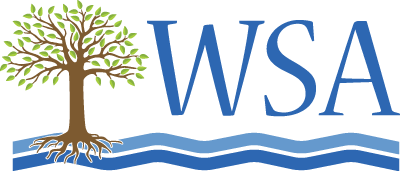February’s Native Maryland Plant
Platanus occidentalis L.
(PLAT-ah-nus ok-sih-den-TAH-lis)
Common Name: American Sycamore
Ever have one of those moments? Often when I’m out driving I spot a plant or animal that compels me to pull over (or turn around) so that I can observe it further, or just enjoy being in its presence. During these last cold days of winter, that is the effect the American Sycamore has on me, its immense, stark white trunks brightening up a forested area along the road, usually riparian, bringing contrast to an otherwise overcast day.
Sometimes I wonder, is it just me?
As I drove behind this school bus last November, it pulled over and seemed to be parking next to an American Sycamore. I imagined the driver was using this opportunity as a teachable moment. Was she stopping to allow the students the chance to study this magnificent native tree? The bus was parked close enough to examine the mottled bark that peels off as the tree expands, exposing its white inner layer and its most recognizable feature. Was she explaining that when young and given enough water, this tree can grow 2 feet a year and can live over 200 years – that its average mature height is 75’-100’? Was she highlighting the round fruits, hanging singularly, like ornaments at the tips of its branches, fruit that is also a seed ball (achene -1) that provides food for a number of birds, including purple finch, goldfinch, dark-eyed juncos and chickadees?
As spring is approaching and you’re planning your garden – don’t forget to plant some trees. Remind yourself of the benefit trees add to our lives – especially the large canopy trees that sequester the most carbon, keep our air breathable, and improve the health of our soils. Those trees with thick branches and large leaves that intercept and slow down rain during storms. The trees that provide dense shade that cool our streets and the stormwater runoff that enters our local waterways. Maybe even consider a Platanus occidentalis.
NOTE: I don’t believe the bus was pulled over observing this tree, although I prefer to imagine it was. It was sitting in traffic waiting for a chance to move forward.
1 achene - an aggregate of many small seed-like fruits
~ Alison Milligan – Mstr Gardener/Mstr Naturalist /Mstr Watershed Steward
Chesapeake Bay Landscape Professional (CBLP)/AA Co Tree Trooper




